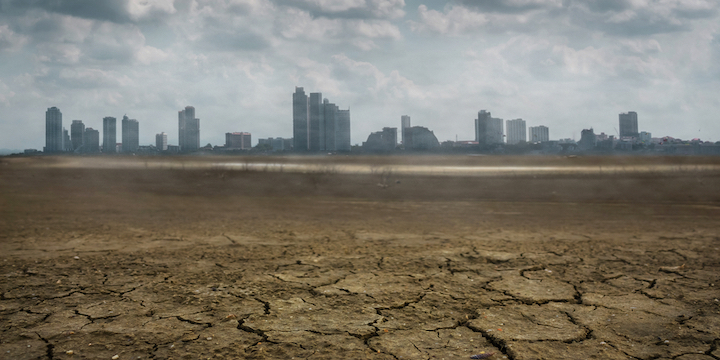Malnutrition, drought, disease … The health of tens of millions of people will be weakened by the consequences of climate change in the decades to come, warns a draft report from IPCC, consulted by AFP.
And many of these effects are already inevitable in the short term, warn UN climate experts in this document to be published in February 2022. In fact, life on Earth as we know it will inevitably be transformed when children born in 2021 will be 30 years old, or even earlier, say scientists.
Three vulnerable pillars
“Human health is based on three pillars: food, access to water and shelter. But they are vulnerable and threaten to collapse“analyzes Maria Neira, director of the Department of Environment, Climate Change and Health at the World Health Organization.
Read also: No country is immune to climate change, points out a report
180 million malnourished in 2050
Regarding food first, the report estimates that an additional 80 million people will be threatened by hunger by 2050. A cascading consequence of poor harvests, a decline in the nutritional value of certain products and a pressure on land linked to growing demand for biofuels or the planting of trees to sequester carbon.
All of these factors will push prices up by around 30% by 2050. This will put more than 180 million people on the brink of chronic malnutrition, mainly in Africa and Southeast Asia.
75% of groundwater threatened
On the water supply side, just over half of the world’s population is insecure. And nearly 75% of groundwater supplies – the main source of drinking water for 2.5 billion people – could be impacted by climate change by 2050. Added to this is the melting of glaciers, which has already “strongly affected the water cycle“(streams, seas, evaporation, rain), according to experts.
Phenomena that could lead by 2050 to the displacement of 30 to 140 million people in Africa, South-East Asia and Latin America and cut the global GDP by half a point.
Pollution, contamination, mosquitoes …
Finally, global warming is expanding the areas favorable to disease vectors, especially mosquitoes. By 2050, half of the planet’s inhabitants could be exposed to dengue, yellow fever or viruses like Zika.
The ravages of malaria or Lyme disease will also increase and deaths from childhood diarrhea will increase at least until the middle of the century. Diseases related to air quality, including ozone pollution, typical of heat waves, will also “substantially increase“.”There will also be increased risks of contamination of water or food.“by marine toxins, warns the report.
Pressures on health systems
At the same time, IPCC experts predict pressures on health systems, such as those that appeared during the covid-19 pandemic, with their “important and negative consequences for the most vulnerable“.
“Life on Earth can recover from major climate change by evolving into new species and creating new ecosystems. Mankind can’t“, concludes the summary of the report.
 Cherry tomatoes contaminated with salmonella: 92 sick and 1 dead
Cherry tomatoes contaminated with salmonella: 92 sick and 1 dead  A better coaching method can make a person grow
A better coaching method can make a person grow  What is the method to prevent diabetes in children?
What is the method to prevent diabetes in children?  What are the effective factors in causing stomach ulcers?
What are the effective factors in causing stomach ulcers?  Why do embarrassing memories seem to appear at night?
Why do embarrassing memories seem to appear at night?  The amazing link between SARS-CoV-2 infection and newly started diabetes
The amazing link between SARS-CoV-2 infection and newly started diabetes  WHO says monkey pox is not a global emergency right now
WHO says monkey pox is not a global emergency right now  Single cell RNA sequencing uncovers new mechanisms of heart disease
Single cell RNA sequencing uncovers new mechanisms of heart disease  Hepatitis of unknown origin: 3 new deaths and 228 cases worldwide
Hepatitis of unknown origin: 3 new deaths and 228 cases worldwide 